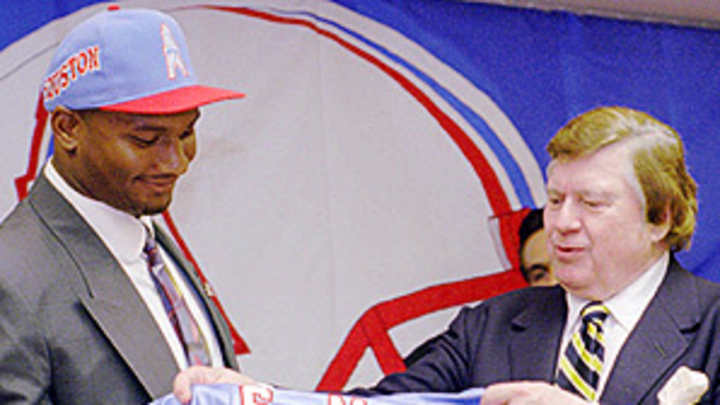McNair's greatest talent? He made everyone around him feel better


The first image that came to mind upon hearing of SteveMcNair's death on Sunday had nothing to do with football.
It was not the raw strong-armed rookie McNair trotting onto the field at Houston's Astrodome for the first time. It was not the young star helping guide the franchise's move to Tennessee.
It was not McNair standing in that familiar pose, both arms raised, and a broad smile across his face, after throwing a touchdown pass. It was not Pro Bowl efforts, All Pro statistics or even the 1999 Super Bowl, when he flung the ball in search of victory until the final snap of the game.
It was McNair, sitting in the back of BudAdams' private jet on a windy April day in 1995.
It was on a horribly turbulent flight from New York to his new home in Houston the day McNair was drafted by the Oilers, when he reached across the aisle to touch his mother's hand.
Here was a 22-year-old kid from Mississippi who had never lived in a town of more than 900 people, looking out the window at the New York skyline and whispering to himself, "I never imagined."
He had only been on a handful of flights, much less a private jet. He had every reason to be anxious, nervous and scared. The world and NFL promises were coming at him a million miles per hour.
But as he had done virtually every day on the way to draft day and as he did every day until his death Saturday, McNair touched people and gave them confidence by just being Steve McNair.
It was the greatest of all of McNair's qualities. He didn't just make players around him play better. He made everyone around him feel better. Former Oilers scout Glenn Cumbee once said of McNair, "He's charismatic. When you're around him, you like being around him. You want to be around him more. I can't remember one better than him. He is unique."
That flight from Teeterboro Airport after McNair's name was called No. 3 overall by then-NFL commissioner Paul Tagliabue was a rocky one. The plane swooped and whipped back and forth, up and down. The winds were so strong, the flight had to stop in Tennessee, ironically his future home, for extra fuel. I had been invited to join McNair on that whirlwind day that would change his life. As the plane swooped through the rough winds, McNair's mother, Lucile McNair, was nervously gasping and flinching, covering her mouth with her hands. With every bump, she looked more frightened. McNair stretched out his hand across the aisle to Lucile McNair and said, "It's all right, Momma. We'll get out of this stuff in a minute. It's going to be fine."
McNair's life and career were filled with moments like that. He always managed to make everything fine, whether it was carrying a franchise in transition from Houston to Nashville, leading a team on third-and-goal with the game on the line or just offering a pat on the helmet, or a touch on his momma's hand.
As much as the numbers and victories, McNair's legacy was about being a true leader, the rock on which others would lean. He was a quarterback in every sense.
The first time I met McNair was a few months before the draft. He was a senior at tiny Alcorn State outside of Lorman, Miss., breaking every record imaginable in the division. I made the trip to see this phenom that all the NFL scouts were talking about.
He was a small-town country kid all right, a product of the sultry old Mississippi backwoods, where oaks were covered in moss, antebellum plantations dotted country roads and kudzu vines were everywhere.
But being a country kid did not mask that McNair was a different kind of kid. People followed him. People were drawn to him. I visited his home, where McNair grew up in a small, un-air conditioned wood-frame home with paint peeling off the walls and steps missing from the front porch. I asked about growing up poor and the influence Lucile McNair had on him. She raised five boys by herself and worked the graveyard 11:30 p.m.-to-8 a.m. shift at a florescent-light company, so she could watch her sons play football on Friday nights and be there every afternoon when they got home from school.
"We always made ends meet," McNair told me. "We didn't have a lot, but we had her. And that was enough."
It was that kind of simple confidence, a matter-of-fact kind of perspective that separated him. He had been recruited by Florida State, LSU, Ole Miss, Nebraska, Mississippi State and Auburn from tiny Mount Olive High. But they wanted him to be a defensive back, so he went to Alcorn. He was told he never would be an NFL quarterback. But he always saw something more for himself. He saw himself doing great things.
And he did, for 13 years in the NFL, carrying along everyone and anyone who knew him. From the day I met McNair until the very tragic end to his life on Sunday, no matter how rocky the ride became, he always made those who knew him feel better.
These are turbulent, scary times. You wonder, as always, how and why this happened. No matter the story behind his death, the memories of what this man was, the way he lived, the way he made people better, will always be his NFL legacy.
